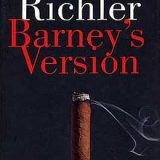Barney’s Version – Mordecai Richler – 1997
Reviewed by: Stephen A. Haines Date: 4 March 2004
How would you respond to the query: “tell me about your life”? Memoirs have great value in giving us a picture of the thoughts about his life and how the world is seen. In an earlier age diaries, with their daily entries provided contemporary records and reflections. Today’s pace has made the daily journal outmoded. Memoirs are usually conceived in a later time of life, and time-eroded memories sometimes vague or disoriented.
 Barney Panofsky has produced a modern memoir. After a long life, he’s reflecting on the vagaries of his journey. He’s experienced some wonderful highs offset by almost overwhelming depths. An aspiring writer who’s made his pilgrimage to the Left Bank of Paris, his “career” became making cheap films. No matter, he ultimately became wealthy from it, but the old adage about wealth and happiness rings with harsh truth. Without formal education, he quotes classics fluently, his self-taught skills brought out with wit and force. Hanging over this relation of a complex man is the loss of his friend and rival, “Boogie Moscovitch. Did Barney really kill him? The trial scene mocks the legal process, bringing to mind a bevy of lawyer anecdotes. All of this is related in Richler’s commanding wit, tinted with his own ongoing quest for justice and virtue, mainstays of his life and writing.
Barney Panofsky has produced a modern memoir. After a long life, he’s reflecting on the vagaries of his journey. He’s experienced some wonderful highs offset by almost overwhelming depths. An aspiring writer who’s made his pilgrimage to the Left Bank of Paris, his “career” became making cheap films. No matter, he ultimately became wealthy from it, but the old adage about wealth and happiness rings with harsh truth. Without formal education, he quotes classics fluently, his self-taught skills brought out with wit and force. Hanging over this relation of a complex man is the loss of his friend and rival, “Boogie Moscovitch. Did Barney really kill him? The trial scene mocks the legal process, bringing to mind a bevy of lawyer anecdotes. All of this is related in Richler’s commanding wit, tinted with his own ongoing quest for justice and virtue, mainstays of his life and writing.
The question immediately arises – is this Barney’s memoir or Richler’s? That really isn’t our business. What counts is how well Richler presents his character, whether semi-fictional or wholly invented. And Richler’s Barney is flawlessly portrayed. A complex man of conflicting emotions, values, accomplishments, he cries out for recognition that his struggle with life makes him a peer to any man. In the words of Low’s cartoon soldier “The hell this isn’t the most important hole in the world. I’m in it!” So we aren’t to judge either whether Barney truly represents Richler, but how convincingly Richler has portrayed Barney. The old clichés, “tragi-comic” or “flawed hero” hover about seeking expression, but labelling Barney or his creator is doomed to failure. Both are far too complex for such simple thinking.
Richler’s superb wit keeps alive a story that might have descended into a mundane relation of a man wallowing in self pity. Barney feels the creeping debilitation of Alzheimer’s, to which he ultimately succumbs. It’s not a pleasant experience for him or the sympathetic reader. Richler isn’t looking for sympathy for Barney or for himself. He’s portraying life as it is, and Richler, through Barney is providing us with a warning.
Richler’s a discriminating social observer and this book covers a lifetime. As a memoir of the mid-twentieth century, the historical aspect seems skimpy, but all the elements are present. The departure from similar accounts reflects what many find uncomfortable; Jews in North America are a sub-community within a population versed in ideals of consensus. Barney’s view of life and the world is from that perspective. He moves in and out of the WASP and Jewish segments of society, but always returns to those roots he understands best, even when tragedy remains such a major part of that culture.
Readers shouldn’t make too much of Richler/Panofsky’s Canadian Jewish origins. This is a book of universal significance. Casting Richler as “a Canadian writer” as some do is to deprive him of proper recognition of his world view. He’s even more than a North American writer, but one who conveys earnestly the trials life presents us all. Some have attested to disappointment that this book failed to cop a Booker. It’s a valid complaint. Perhaps a greater award will be forthcoming. It’s overdue.















